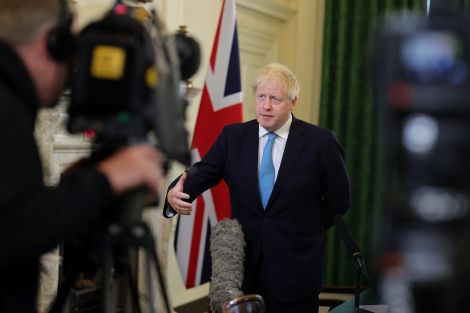Politics / Boris Johnson responds to letter on Shetland self-determination – and hopes to visit isles this year
PRIME minister Boris Johnson says the UK Government is “keen to see power sit at the most appropriate level” after being contacted by Shetland Islands Council’s political leader on the issue of self-determination for the isles.
In a letter sent to council leader Steven Coutts in November, the prime minister also said he hoped to visit Shetland this year.
The letter came to light as the result of a Shetland News freedom of information request.
Councillors voted overwhelmingly in September to explore options for financial and political self-determination amid frustration over the financial settlement and decision-making abilities offered by central government.
Coutts wrote to Johnson and Scottish first minister Nicola Sturgeon a week after the 18-2 vote to request meetings with the political figureheads and senior ministers to discuss options for self-determination.
The councillor said in his letter that the “strength of feeling demonstrated by the vote highlights that the status quo is not tenable”.
“The current arrangements undermine the prosperous and fair future for Shetland residents we want to see,” Coutts said.
Prime minister Johnson responded on 5 November, but he didn’t appear to give much away.
The Conservative leader said he agreed with Coutts about the “importance of Shetland and its proud traditions of the contribution to the United Kingdom”.
“Regarding devolution of power, the United Kingdom government has already demonstrated its commitment to this in areas such as Greater Manchester and London, as well as in Scotland,” the prime minister continued.
“We take seriously the commitments made as part of the Smith Commission to further devolve power from Holyrood to communities across Scotland.”
Johnson said that the government is keen for power to sit at the “most appropriate level of government, including local government, and there is much that the devolved administration in Edinburgh could learn from United Kingdom government practice in that respect”.
Become a member of Shetland News
“This ‘shared experience’ is just one of the many benefits that accrues to Scotland as a consequence of being part of the United Kingdom and we will always work constructively with other layers of government to ensure the best outcomes for people, businesses and jobs,” he continued.
“I know that you had a constructive initial discussion with the Secretary of State for Scotland on 2 October. As you can imagine, the ongoing pandemic has placed significant restrictions on my time and travel – however, the Secretary of State for Scotland would be happy to meet you further to discuss the issues that you raise, and I hope to be able to visit in the New Year.”
The Scottish Government responded more promptly, on 6 October, although it was islands minister Paul Wheelhouse who got back to Coutts on behalf of the first minister.
He said: “The vote in favour of the motion to pursue options for self-determination is undoubtedly a significant event, and has understandably generated a high level of interest in the ambition of Shetland.
“Whilst the Islands (Scotland) Act 2018 introduced a number of measures to support and enhance local decision making such as the Additional Powers Request (Scotland) Regulations 2019, we understand that you wish to conduct extensive research into the most attractive future model for autonomy for Shetland and would welcome and update in due course.
“As I am sure you understand, the immediate priority for the First Minister and members of the cabinet is the response to, and recovery from, the extraordinary impact of Covid-19.
“However, I have instructed officials to identify a suitable time for a meeting involving Shetland Islands Council, the minister for Europe and international development, Jenny Gilruth, and myself as minister for energy, connectivity and islands.”
Coutts confirmed that the council did indeed meet with Scottish Secretary of State Alister Jack, with self-determination one of the items on the agenda, while the SIC also took part in a meeting with Wheelhouse and Gilruth from the Scottish Government.
However, he said there have not been any more political meetings with the governments since.
“It was very much laying out the background behind the motion and understanding where the respective governments were placed in terms of engagement with us,” Coutts said.
The council leader said the pandemic has added challenges when it comes to time for ministers to meet with the SIC.
But he described the early meetings as “productive”.
Coutts said one topic of discussion was around energy prices in Shetland.
He said with significant onshore wind generation coming in Shetland, as well as potential offshore turbines, there is a disparity at play when it comes to the cost for local energy consumers.
“One of the things that I would reflect is that we have one of the highest fuel poverty rates in the country and a lot of that is due to the energy regulation and where those decisions are being set,” Coutts said.
The leader said community engagement is another strand of the process around exploring self-determination.
Coutts said councillors Duncan Anderson, Alec Priest and Andrea Manson would be leading on this to “ensure that there’s wide discussion”.
All three elected members included greater self-determination in the manifestos during the last local election in 2017 and were a driving force behind the motion which went to a vote in the council chamber.
Anderson said the councillors are currently in the process of contacting the people who responded with interest in being involved after an online event was held in December.
“We are then going to have discussions about the next community engagement steps,” he said.
Become a member of Shetland News
Shetland News is asking its many readers to consider paying for membership to get additional features and services: -
- Remove non-local ads;
- Bookmark posts to read later;
- Exclusive curated weekly newsletter;
- Hide membership messages;
- Comments open for discussion.
If you appreciate what we do and feel strongly about impartial local journalism, then please become a member of Shetland News by either making a single payment, or setting up a monthly, quarterly or yearly subscription.


































































